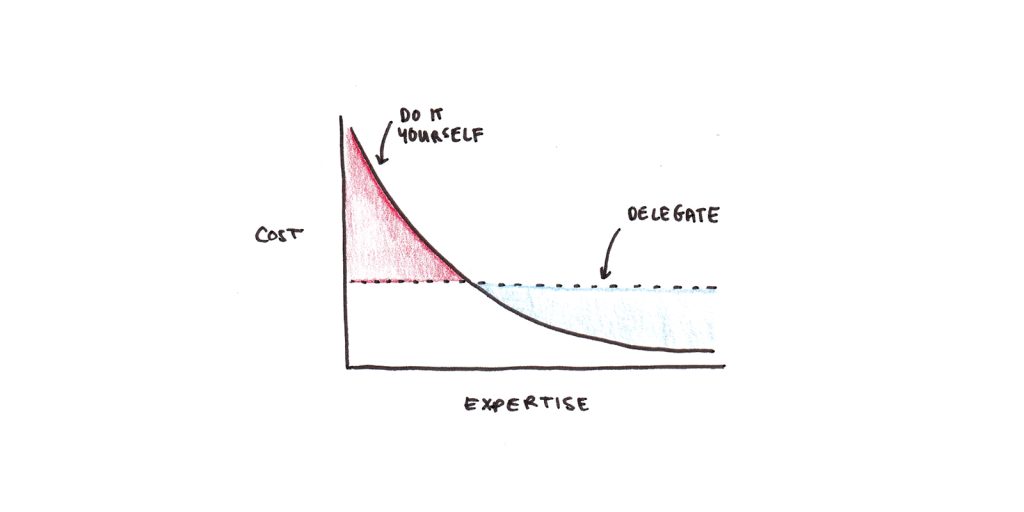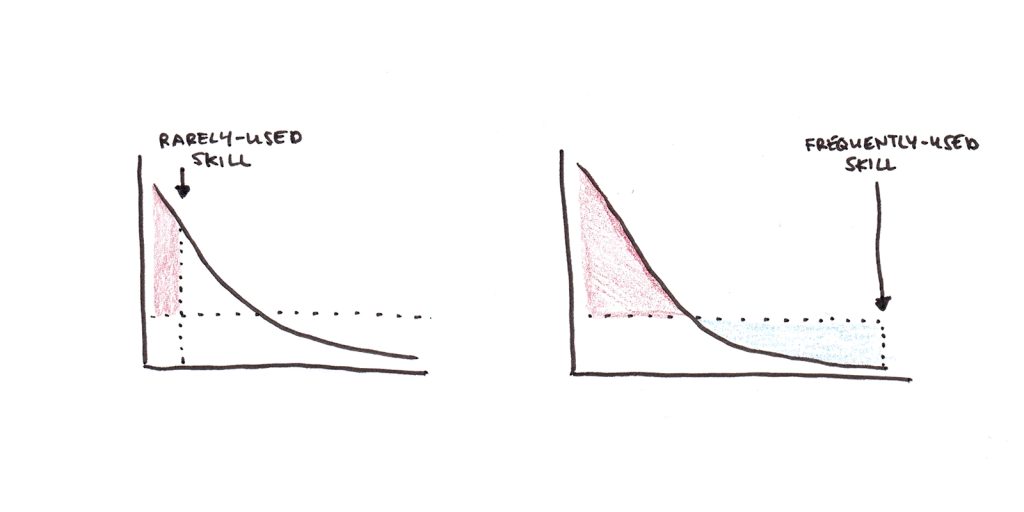
[ad_1]
One of many few classes I recall from enterprise college is the make-or-buy choice. Massive corporations usually face a selection: ought to they make one thing in-house, or outsource it to a provider?
The choice depends upon many components, however an enormous half is value: will it’s cheaper or extra dependable in the event you spend money on in-house manufacturing? Or does it make extra sense to pay another person to do it?
Choices about whether or not or to not study one thing are sometimes related. For nearly any conceivable ability you possibly can:
- Study to do it your self.
- Rent another person to do it.
- Keep away from doing it completely.
Think about programming. You would study to jot down code, rent a programmer to do it for you, or select work and initiatives that don’t require you to create software program.
Or language studying. You would study to talk Mandarin, rent a translator, or keep away from doing enterprise with monolingual Mandarin audio system.
The identical selection applies to numerous different expertise, from understanding the tax code to making use of medical recommendation, repairing drywall or planting a backyard. You may study, outsource or keep away from.
Studying Hardly ever Makes Sense Quick-Time period
One frequent function of this drawback is that the prices of studying not often make sense in the event you’re solely eager about speedy advantages. Even in the event you’re the neatest individual on earth, hiring a Mandarin translator, Java programmer or automobile mechanic to take care of your drawback nonetheless takes much less time and power than studying to unravel it your self from scratch.
But, in the event you already know methods to resolve an issue, doing it your self is commonly (however not at all times) the best choice. Hiring individuals takes time, will increase the likelihood they gained’t perceive or be capable to ship what you need and may be dearer.
Seen this fashion, the optimum level for a lot of learn-or-delegate selections depends upon your prior experience:
This evaluation suggests you must do what you’re good at, and delegate what you’re not.
The main wrinkle on this strategy is that your degree of experience isn’t fixed. It varies relying on the quantity of apply you’ve had on the issue. One of the crucial well-known empirical outcomes is the energy legislation of apply, suggesting that many elements of proficiency comply with a roughly power-law relationship with the quantity of apply.
The reply to the learn-or-delegate choice doesn’t rely solely in your present degree of experience, but additionally on how usually you count on to carry out the ability. For those who’re presently beneath the competency threshold the place doing it your self is smart however will most likely use the ability lots, the entire lifetime value of studying could find yourself being lower than delegating:

Whereas I’m utilizing an financial lens right here, the reasoning nonetheless applies outdoors your job. How a lot I get pleasure from portray as a passion depends upon how good I really feel I’m at it. Thus there’s usually an implicit learn-or-ignore choice with leisure actions that follows the identical trade-off.
Do We Underinvest in Studying?
To summarize, many choices about studying have the next options:
- Doing it your self doesn’t initially cross a cost-benefit check.
- The extra you apply, the decrease the associated fee turns into.
- Thus whether or not it’s “value it” to study one thing depends upon a far-sighted calculation of how a lot you’ll want to make use of the ability.
Sadly our intrinsic motivational system is remarkably short-term in its focus. Instant prices or payoffs affect our choice excess of long-term ones. Experiments present individuals usually pay steep low cost charges for delayed rewards, in methods which might be inconsistent with any rational agent (even an especially impulsive one).
This means we could also be underinvesting in studying. We’re disinclined to apply expertise that fail an preliminary cost-benefit evaluation—even when our funding of apply could be worthwhile over the course of our lifetime.
This perception helped Vat and me whereas studying different languages. The prices of practising a language are comparatively excessive once you’re not persistently utilizing it. Within the brief time period, forcing your self to work together in a brand new language can also be pricey. However, in the event you apply sufficient, talking the language of the nation you’re visiting turns into simpler than sticking completely inside an English bubble. Adults are resourceful and regularly discover methods to keep away from utilizing an unfamiliar language; the consequence is that few get something near the degrees of publicity that younger youngsters can’t assist however get when studying.
Matthew Results in Studying
One other consequence of this fundamental mannequin is that we must always count on Matthew Results in studying.
The Matthew Impact was first coined by sociologists Robert Merton and Harriet Zuckerman of their examine of elite scientists. Eminent scientists usually get extra credit score than unknown researchers for related work, which means that, over time, eminence tends to compound whereas much less well-known lecturers linger in obscurity.1
Later, psychologist Keith Stanovich utilized the identical perception to studying. These with a slight benefit in early studying skill had a barely decreased value of studying new materials. This result in them practising extra, additional decreasing the prices of studying. Given the connection between studying and different types of studying, he even hypothesized that early studying skill may bootstrap intelligence by making it simpler to accumulate new expertise and information.
Analysis bears out Stanovich’s speculation. In a examine equivalent twins who diverse in early studying skill, the marginally more adept twin later confirmed positive aspects in intelligence in contrast with their genetically-identical sibling. Abilities beget expertise; information begets information.
Specialization and Specializing in Strengths
At this level, it’s useful to make clear. I’m not suggesting that since realized expertise get simpler with apply, we must always do every little thing for ourselves and by no means delegate.
That is false, even by the essential logic I’ve spelled out above. Some duties merely aren’t encountered regularly sufficient to cross the associated fee/profit threshold. I’ll by no means have a possibility to talk Mongolian, so if I ever meet a monolingual Mongolian speaker, I’d be blissful to lean on Google Translate.
Moreover, we will’t think about expertise in isolation. Spending time studying one factor is an implicit choice to not study one thing else. I might study French, however that point is taken away from studying Mandarin. I might study Javascript, however that point can’t even be spent studying Python.
In the end, specialization, not self-sufficiency, is the street to abundance on the planet we dwell in as we speak. We delegate the overwhelming majority of expertise in our lives, not as a result of studying all of them is unattainable, however as a result of getting actually good at one factor is smart when it’s comparatively straightforward to delegate every little thing else.
Regardless of spending years studying programming, I do just about none of it for my very own enterprise. Provided that my writing is central to my enterprise, and I don’t have sufficient time to do all of the writing I’d like, hiring different individuals to do the programming makes extra sense. These individuals, in flip, are typically a lot additional alongside the experience curve than I’m as a result of they’ve made an identical choice to specialize.
That being mentioned, there are a lot of cases the place expertise can’t simply be delegated. I would be capable to rent out behind-the-scenes programming for my web site, however it doesn’t save effort or value to rent somebody to learn the analysis used to jot down the articles. If I don’t perceive the analysis, I can’t weave it into the textual content I’m producing.
In different circumstances, delegation is an imperfect or inconvenient substitute for having the ability to do one thing your self. Counting on a translator shouldn’t be equal to having the ability to communicate the language your self once you transfer to a different nation. Having the ability to learn a textual content isn’t made redundant if somebody narrates it to you aloud. Thus having the ability to communicate the language of the nation you reside in and having the ability to learn are expertise which might be nearly definitely value mastering.
Excited about Studying within the Lengthy-Time period
I discover it helpful to bear in mind a number of issues once I face resistance to studying one thing new:
1. How a lot can I count on this ability to get simpler with extra apply?
One method to estimate that is to take a look at individuals with various levels of expertise. How a lot effort did it take them to do what you wrestle with? The training curve is sort of steep for some expertise—you get good comparatively shortly. For others, the curve is flat for a very long time—you could must apply for years earlier than you are feeling it’s well worth the effort.
2. How a lot would I take advantage of the ability if I used to be higher at it?
Supposing you would attain the comparatively flat a part of the apply curve, how a lot would you employ it?
For those who dwell in a rustic that speaks a language you don’t know, studying that language would positively cross the cost-benefit check. Studying a serious world language you may use in work or academic contexts most likely additionally does. A distinct segment language that isn’t spoken a lot … perhaps not? On this case, it might solely be value studying when you have a robust intrinsic motivation to study it.
If a ability is central to your profession, it might simply be value the associated fee, even whether it is initially tough so that you can study. In distinction, a profession ability that doesn’t match nicely together with your present expertise could go unused even in the event you’re almost an professional—it’s merely cheaper to outsource.
3. How a lot would I benefit from the ability, conditional on being higher at it?
Financial rewards aren’t the one motivation. For those who’re good at one thing, you are likely to get pleasure from it extra and draw private satisfaction. However that’s extra true of some expertise than others. You is likely to be significantly pleased with having the ability to paint a practical panorama however not really feel too particular about having the ability to file your taxes shortly.
Deciding when it is smart to study isn’t trivial, however on condition that our intuitions usually give us a misleadingly short-term image of what’s attainable, it may be useful to assume extra deeply about it.
Footnotes
[ad_2]